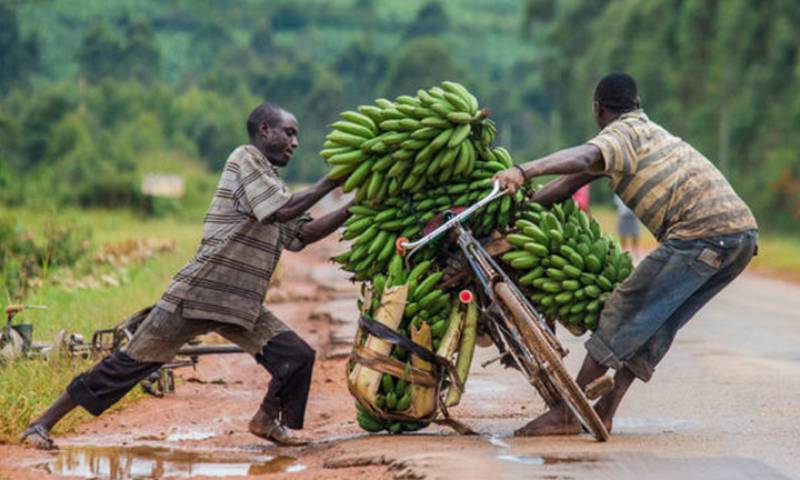She prefers to ferry her ginger, oranges, mangoes, vegetable and pepper from Uganda to sell in Kenya rather than get them from Kenya where the profits are thin and the supply is not guaranteed. Violet Mutahi, a trader at the Kakamega retail market, was introduced to the cross-border trade by a friend and is now among a group of traders from Western Kenya who cross over to Uganda to buy food crops to sell in Kenya.
“Three quarters of the food we sell largely comes from Uganda and at times Tanzania. What we get from Kenya is just sukuma wiki and kunde. We get the rest such as eggs, ginger, tomatoes, bananas, simsim and groundnuts from Uganda,” she says.
Her words are backed by a report by the United Nations COMTRADE database on international trade, which puts Kenya’s imports from Uganda last year at $225.14 million (Sh25.3 billion). The bulk of the imports were dairy products, eggs, honey and edible products like corn, beans, millet, cassava, sorghum and sweet potatoes, which accounted for $64.35 million (Sh7.2 billion).
The goods cross the border through middlemen some of whom supply them in trucks in the larger western region or simply sell at the border area on no man’s land, popularly known as Sofia. Ms Mutahi gets her stock of lemon and ginger from the Uganda side of the border where it is cheaper and loads it onto a matatu to sell in Kakamega.
“I buy a basket of lemon at Sh8,000 and sell it at Sh12,000 in western Kenya. A bag of ginger goes at Sh 9,000 and I sell at Sh15,000. These products fly like hotcakes in the market,” says the businesswoman who nets between Sh25,000 and Sh30,000 every week from the Uganda lemon and ginger alone.
She used to get the products from Kenya but stopped the deal because the Kenyan lemon variety – like is the case with many food products in the country – was expensive and could waste away in the market.
“Again, you had to wait for so long to get the supply from Central Kenya,” she says.
Mutahi is among traders who cross the border to get foodstuffs from Ugandan and sell it in western Kenya, which despite having good soil and favourable weather, has become a net importer of food like dry countries.
“If I cross over and get pumpkins, simsim, cassava or any other seasonal food crop, I buy it and sell it in Kenya. That’s a sure bet because few people plant such foods on our side,” she says.
Every market day, trucks carrying onions, bananas, pineapples, watermelon and other foods from Uganda and those ferrying oranges from Tanzania supply the goods in Busia, Vihiga, Bungoma, Kakamega, and even Kisumu markets.
Stephen Obala, the chair of Busia-Kenya Business People Association, says foods consumed and sold on the border side of Kenya are grown in Uganda. Many people we talked to believe the Baganda are more privileged with better soils and weather than Kenya. It is even joked that when Uganda shuts its flood gate of food exports to Kenya, Kenyans would sleep hungry.
“You remember when Kenya banned maize imports from Uganda and Tanzania in February. How long did you people take to lift the ban? Were you not going to starve?” asks Jared Mmbabazi, a truck driver who plies his trade ferrying pineapples from Uganda to Kenya.
The February ban by the Agriculture and Food Authority lasted a week and was because of the levels of mycotoxins in the maize from the two countries. As to whether Kenyans could starve because of the ban or not remains debatable.
Dr Caroline Kundu of Kenya Agricultural and Livestock Research Organisation (Kalro), who heads the Kakamega centre, says Uganda and Kenya share a warm tropical climate.
“The rainfall patterns are similar just as the soils are largely similar in the two countries. What makes the difference in the agricultural produce output is the cost of production,” she says.
“For some reason, labour and cost of seeds, fertiliser and other farm input in Uganda are cheaper than it is in Kenya. This makes them (Baganda) do a lot of agriculture, with the net effect being producing more food than us,” she says.
The soils expert also believes that the Baganda have a good attitude that drives them into farming rather than white collar jobs that are a favourite of Kenyans.
She says there is hope of reversing the trend if and when Kenyans resolve to take up agriculture as a core pillar of growth and not a pastime for the jobless as the State advocates.
“Look, Uganda is exporting sweet potatoes that some Kenyans consider a crop of the poor. The Baganda farmers work cooperatively and love to invest in knowledge-driven agriculture because agriculture is business,” she says.
“At times you have to stand on the Kenya-Uganda border and look at the numbers flocking to Uganda for food. We can easily produce things like eggs and milk to get the meaning of what not taking agriculture seriously means,” she says.
But it is not only Kenya which flocks to Uganda for food. Statistics from World Integrated Trade Solutions show that India, Egypt, Thailand and Saudi Arabia are in the mix, too.


